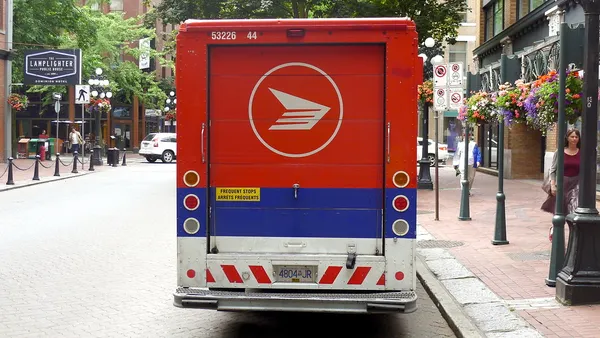Dive Brief:
- Amazon is teaming up with the Massachusetts Institute of Technology for a competition in which participants are tasked with creating a route-planning algorithm that can take into account the learned knowledge of delivery drivers, the retailer and school announced last week.
- The idea is that drivers gain an understanding of their delivery route over time and begin to understand where they can park, where the traffic will be bad and other considerations that aren't necessarily caught with traditional optimization models used for route planning.
- Participants in the competition will be provided historical delivery data from Amazon that includes locations, package dimensions, travel times and distances between locations. There will also be "more than 4,000 traces of driver-determined routes, which encode the drivers' know-how," according to MIT's announcement.
Dive Insight:
Traditional route-planning algorithms will try to find the fastest or shortest route between a given set of customers. The technology's use by companies such as Coca-Cola and UPS have already become case studies of the method's success over the last decade.
But the modern delivery environment has changed a lot in the last few years, according to Matthias Winkenbach, director of Massachusetts Institute of Technology's Megacity Logistics Lab.
"Cities especially are becoming ever more complex to actually operate in," Winkenbach said. "They're getting more congested, they're getting denser, just getting more and more difficult to efficiently deliver goods in the city."
In addition to that, companies like Amazon have set high standards when it comes to speed and customization of delivery. And e-commerce means that routes are popping up in new locations.
Amazon providing historical delivery data to the route-planning research community can help drive progress in the field. And Amazon is not alone in looking to optimize its route planning. UPS has filed a patent application for a route-planning system that would allow customers who need to sign for deliveries to offer alternative meeting spots and it would track the customer using GPS to help update to the optimal path.
The availability of data and modern analysis techniques like machine learning have helped to push forward route planning and made it more dynamic. The field of routing is continually evolving with "hundreds of publications" on how to improve the models every year, Winkenbach said.
The new research has come in three forms: tweaking the routing algorithm to find improvements, making changes to the data (whether it is adding new variables or using data in a new way) or looking at new delivery technologies like drones. The Amazon MIT competition finds itself fitting into the second category of new data.
"The problem isn't just a purely theoretical exercise, but has a real-world meaning, has real-world impact," Winkenbach said.
Participants can register for the competition starting Monday. Data and instructions will be released on March 15, starting the research period, and participants will have until June 18 to work on their models. Winners will be announced at the end of July. First place will go home with $100,000.














